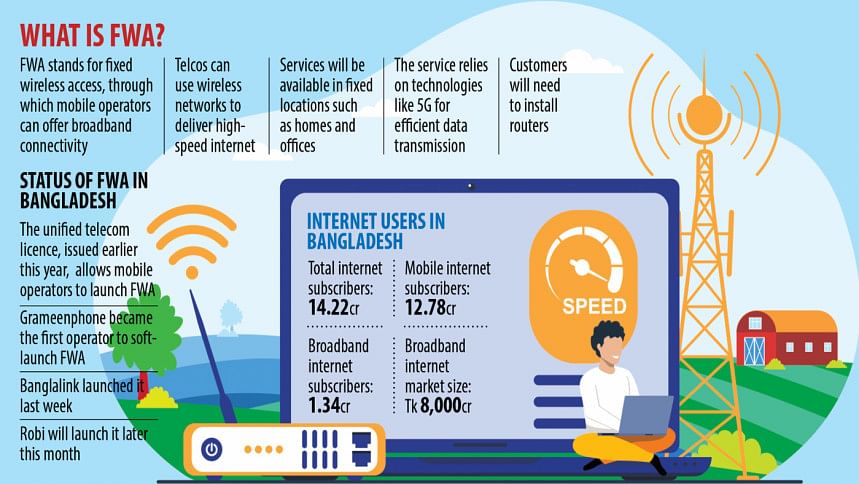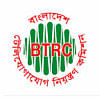Mobile phone operators join race to capture broadband market

The country's three private mobile network operators are racing to grab a share of the rapidly expanding broadband market by offering fixed wireless access (FWA) services, which give users Wi-Fi connections without cables.
After the Bangladesh Telecommunication Regulatory Commission (BTRC) allowed mobile phone operators to launch FWA services in its cellular mobile services guidelines earlier this year, Grameenphone became the first to soft-launch such products.
It rolled out a service called "gpfi unlimited" yesterday.
Banglalink introduced FWA services last week in partnership with a third-party router supplier. Robi plans to roll out a similar service later this month.
The moves are expected to spark fierce competition in the Tk 8,000 crore broadband internet market in Bangladesh.
Competition will intensify not only among operators but also between network carriers and broadband internet operators.
In Bangladesh, telecom operators provide mobile internet while internet service providers (ISPs) offer broadband services.
Generally, mobile operators deliver services through cellular networks, utilising technologies such as 3G, 4G, and 5G, which enable wireless data transmission to smartphones and tablets, offering flexibility and mobility. On the other hand, broadband companies provide internet via fixed-line connections through cables or fibre optics.
In recent years, the broadband internet market in Bangladesh has expanded rapidly, with 1.34 crore subscriptions as of May, leading to the flourishing of a large number of service providers.
Now, mobile network operators will be able to offer similar services. In order to obtain the service, customers will need just an indoor modem or router and a subscription plan.
However, according to industry insiders, ensuring stable and high-speed connectivity with greater bandwidth and reliability compared to wired broadband will be difficult for operators.
Mohammad Sarwar Alam, assistant professor at the University of Chittagong, has been using 'gpfi' for over six months.
He identified the pros and cons of the service.
He said the internet speed is satisfactory, adding that he can take the router anywhere and use it wherever Grameenphone's network is available.
"However, if the user is present in a room while the router is kept in another room with the door closed, the internet speed starts to fluctuate."
Furthermore, the amount of available spectrum directly affects the capacity and speed of FWA services, posing a challenge for operators. This is because the deployment rate of higher frequency bands such as 2300 MHz and 2600 MHz, used for 4G LTE (long-term evolution), and potentially 5G technology, is low in Bangladesh.
Although the auction for these spectrum bands was held over two years ago, operators have deployed less than 20 percent of the frequencies they have purchased. These bands are crucial for FWA services as they support faster data rates and greater capacity, according to industry experts.
Grameenphone offers two types of routers: one priced at Tk 4,000, which can connect 10 devices, and another priced at Tk 7,500, which can support 32 devices.
Currently, there are three subscription plans: Tk 1,000 per month for 25 Mbps, Tk 1,300 per month for 30 Mbps, and Tk 1,900 per month for 40 Mbps.
As such, prices may be another barrier to mass usage as consumers can buy cheaper broadband packages from traditional ISPs.
Md Emdadul Hoque, president of the Internet Service Providers Association of Bangladesh, stressed that mobile operators should not be allowed to provide any such services through cables.
Taimur Rahman, chief corporate and regulatory affairs officer of Banglalink, said: "Over the past 24 months, we have invested heavily in doubling our nationwide network coverage and enhancing our customers' digital experience by acquiring additional spectrum.
It now offers fixed wireless services through routers, including the Banglalink MiFi routers and fixed routers. Recently, the company partnered with TP-Link to provide high-quality speed with bundled offers.
"We believe in offering seamless, uninterrupted connectivity by combining mobile telephony and fixed wireless services, allowing customers to enjoy optimal internet speeds anytime, anywhere," Rahman said.
"We can do this, or this can be done through partnership models."
Shahed Alam, chief corporate and regulatory officer of Robi Axiata Limited, said WFA has been launched in various countries around the world to cater to the growing demands for uninterrupted high-speed internet service.
Robi had completed preparations to provide wireless broadband services using advanced technology by combining 4G and 5G technology.
"The service will be launched on a wide scale soon," he said. "We believe that this service will open a new option for customers in terms of availing high-speed internet services."
He said competition in the internet service sector will increase through this initiative, providing quality internet service for consumers.
"However, to ensure customer satisfaction, we are conducting thorough market research and gathering overall experience on service delivery variables in this regard."

 For all latest news, follow The Daily Star's Google News channel.
For all latest news, follow The Daily Star's Google News channel. 








Comments